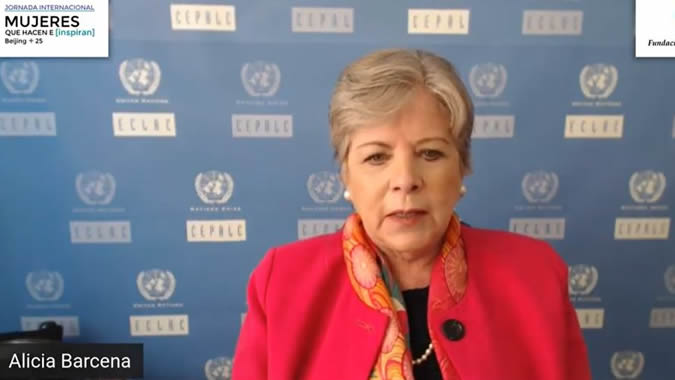Alicia Bárcena: Latin America and the Caribbean’s Post-Pandemic Recovery Will Be Feminist, or It Will Not Be At All
Work area(s)
ECLAC’s Executive Secretary participated in the fourth International Workshop on Women who Do and Inspire (Beijing+25), organized by Fundación Global of Argentina.

“The post-pandemic recovery of Latin America and the Caribbean will be feminist, or it will not be at all,” Alicia Bárcena, Executive Secretary of the Economic Commission for Latin America and the Caribbean (ECLAC), said this Tuesday during the fourth annual edition of the International Workshop on Women who Do and Inspire (Beijing+25), organized by Fundación Global, a non-profit organization based in Argentina.
“The role of the State and public policies will be critical for bringing about a care economy, which is key to the recovery. A fiscal compact focused on women will be needed for this, shifting resources over to investment, job creation and women’s digital and financial inclusion,” ECLAC’s most senior representative emphasized.
Bárcena particularly advocated for building comprehensive care systems and for care work to be considered a public good.
The Executive Secretary participated on the panel “More Women, More Economy: Management in Times of Pandemic,” along with Rebeca Grynspan, Secretary General of the Ibero-American General Secretariat (SEGIB); Silvia Tenazinha, Head Manager of Commercial Banking at Santander Río; Claudia Álvarez Argüelles, CEO of Alvarez Argüelles Hoteles; and Cecilia Nahón, Representative of Argentina and the Southern Cone at the World Bank and former Argentine Ambassador to the United States. The moderator was Fabiana Ricagno, a lawyer, businesswoman and leader of the Pollera Pantalón Initiative.
In addition to underscoring that the pandemic has exposed and will surely intensify the structural constraints of gender inequality in the region, Bárcena stressed the important role that women can play in the current stage of co-existence with the coronavirus (COVID-19) and transition towards eventually attaining a vaccine, carrying forward habits of prevention and health care, without that entailing an overburden of work or loss of their autonomy.
“We are facing a development model that is associated with the concentration of wealth, inequality, environmental deterioration and the postponement of women’s autonomy, in physical as well as political and economic spheres,” ECLAC’s highest authority said.
“In our region, GDP (Gross Domestic Product) is going to fall -9.1%, unemployment will reach 44 million people, poverty will increase to end up affecting 230 million people (of whom 118 million will be women), and above all the overburden of care work is going to be concentrated in the poorest households,” she specified.
One out of every three women in the region does not have her own income, and the crisis stemming from COVID-19 may entail a setback of more than 10 years in women’s participation in the labor market, Bárcena said, since around 57.2% of women’s employment is concentrated in high-risk sectors (versus 40.3% of that of men).
It is also forecast that more than 2.7 million formal microenterprises in the region will close, with a major impact on female merchants and producers, she noted.
There has been progress on policies in the region, but we must step up support for women, Bárcena sustained.
“We need a social compact, a cultural transformation in the face of this civilizing crisis that is showing us that the most important thing is the basic infrastructure of life: health, nutrition, education. We are the women who provide this infrastructure, that is why it is necessary to create a care society. Very concrete measures must be taken, for example, ensuring a basic income for women living in poverty who participate in the care economy, beginning with the first and second quintiles, and at least guaranteeing a minimum wage for women and men working in essential services, which can really propel GDP,” she concluded.
Subregional headquarter(s) and office(s)
Type
Country(ies)
-
Argentina
- Latin America and the Caribbean
Related link(s)
Contact
Public Information Unit
- prensa@cepal.org
- (56 2) 2210 2040
